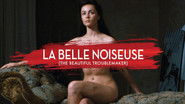Derry Herrera
Not sure how, but this is easily one of the best movies all summer. Multiple levels of funny, never takes itself seriously, super colorful, and creative.
bradclacy
Jacques Rivette's four-hour masterpiece 'La Belle Noiseuse' is a brilliant adaptation of Balzac's famous short story 'Le Chef-d'oeuvre inconnu' (The Unknown Masterpiece). Both are quite different in their approaches, yet both effectively demonstrate the struggles of an artist's perfectionism and contain good philosophical musings on the nature of art. Highly recommend both. Excellent casting as well. I especially liked the choice of Jane Birkin as the ageing muse.
SnoopyStyle
Famed painter Edouard Frenhofer (Michel Piccoli) has been living in quiet secluded retirement with his model wife Liz (Jane Birkin) on a large country estate. They are visited by Marianne (Emmanuelle Béart), her artist boyfriend Nicolas, and an art dealer. Frenhofer is taken with the beautiful Marianne. She inspires him to restart his abandoned La Belle Noiseuse painting with the young nude model in long sessions.The plot is simple. The characterization is compelling but the movie is slow and it is extremely long. It is four freaking hours. This is more about the act of creating. Despite the extended scenes, the drawing process is quite riveting even when Béart isn't naked. There is a hypnotic feel watching him create something on the blank page. The movie is too long for most audiences. Painting may be fascinating but it's not worth sitting for four hours straight.
kurosawakira
The best films, for me, are not essentially different from a nice walk, a wonderful meal, interesting sounds, interesting light. And this is not to say that film is something one might call mundane, as in devoid of life. I'm merely saying that life is magical. I'm not surprised, then, that this film, so very effortlessly, speaks to me without trying to say too much. I can now say I've been a witness – I was there, I saw him, I saw her. I was both him and her. I was outside, too, looking in embarassedly, full of shame and anger for not knowing, not being part of it.I can't ask much more from a film, really. This is the first film I've ever seen by Rivette, and while I'm not in a rush to go to see more, "La belle noiseuse" (1991) is among the most rewarding and memorable film experiences of my life.The great motif is time. It's a presence on its own, the space and air in which we live, either strengthening us or eroding us, even evading us when we chase its tail. Some films insist the viewer feel the passing of the time with intense awareness. Béla Tarr works this way, "Sátantangó" (1994) and "A torinói ló" (2011) two examples. In those films time persists, it hangs over the viewer heavily like a pregnant cloud or thick mist. There part of the point is to react, then subside. This is how I feel about those films, the former which I've seen about a dozen times, the latter only once and would struggle to see again in its entirety. But here, time flies, or as the Latin saying quite aptly has it, time escapes. I was shocked at how engrossing every single moment is, a testament to Rivette's expertise to rivet us, to make us care. About what, exactly? The painting? Marianne? Edouard? The film? Ourselves as witnesses? Art? Ourselves as artists? Voyeurists? Does it have to be either/or?The ending is appropriate, and is, below the surface, a thunderous climax – what we see is not what we've witnessed, and, as accounted by the narrator, Marianne would after the experience merely assume a new mask. The dialogue between Edouard and Nicolas about the former's categorical impetus for truth contributes to the film as an appropriate summa.
museumofdave
You've heard the expression about as exciting as watching paint dry. With this version of Rivette's glum excursion into an artists blockage, the viewer has 236 minutes to watch the paint dry--and often watch the sketching, which is dull, indeed. Four glum people sit in beautiful surroundings in what appears to be a summer mansion, and either don't say much to one another, or complain about lack of feeling. While its obvious the filmmaker is sincere in attempting to explore the development of human character through interaction and decision making, Rivette also neglected to remember what I think is a cardinal rule of motion pictures--they move! I can recognize some folks will become entranced by the dedicated portrayals of talented actors, and also understand while folks will be driven out of the room by the sullen inactivity--how many ways can one woman pose for a painting in one day without anything apparently happening? Id like to see the two-hour version of the film, which might be a little more riveting




